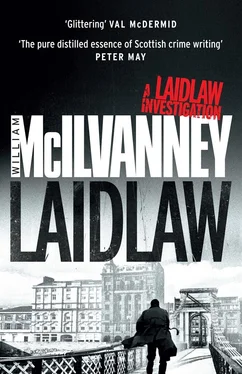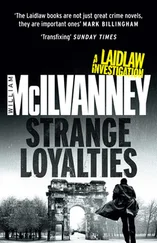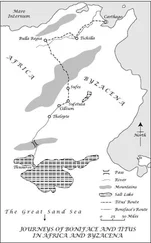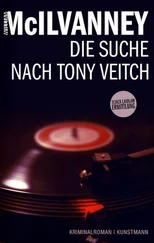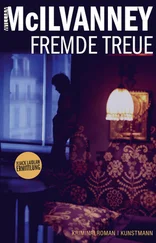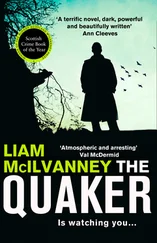William McIlvanney - Laidlaw
Здесь есть возможность читать онлайн «William McIlvanney - Laidlaw» весь текст электронной книги совершенно бесплатно (целиком полную версию без сокращений). В некоторых случаях можно слушать аудио, скачать через торрент в формате fb2 и присутствует краткое содержание. Год выпуска: 1977, ISBN: 1977, Издательство: Sceptre, Жанр: Полицейский детектив, на английском языке. Описание произведения, (предисловие) а так же отзывы посетителей доступны на портале библиотеки ЛибКат.
- Название:Laidlaw
- Автор:
- Издательство:Sceptre
- Жанр:
- Год:1977
- ISBN:0857869868
- Рейтинг книги:5 / 5. Голосов: 1
-
Избранное:Добавить в избранное
- Отзывы:
-
Ваша оценка:
- 100
- 1
- 2
- 3
- 4
- 5
Laidlaw: краткое содержание, описание и аннотация
Предлагаем к чтению аннотацию, описание, краткое содержание или предисловие (зависит от того, что написал сам автор книги «Laidlaw»). Если вы не нашли необходимую информацию о книге — напишите в комментариях, мы постараемся отыскать её.
Laidlaw — читать онлайн бесплатно полную книгу (весь текст) целиком
Ниже представлен текст книги, разбитый по страницам. Система сохранения места последней прочитанной страницы, позволяет с удобством читать онлайн бесплатно книгу «Laidlaw», без необходимости каждый раз заново искать на чём Вы остановились. Поставьте закладку, и сможете в любой момент перейти на страницу, на которой закончили чтение.
Интервал:
Закладка:
‘Something’s happened. Something terrible.’
‘What is it, Tommy?’
‘I need your help. I’ve killed a girl.’
The statement spread between them like a steppe.
‘Tommy,’ Harry said.
They listened to each other’s silence hopelessly.
‘Tommy.’
The name died out between them. Harry was amazed to find that his voice knew what to say.
‘What is it you want me to do?’
‘You bring me paper and a pen. I need to write things down. I need to know what’s happened.’
It was pathetic, as if somebody dying of throat-cancer should ask for pastilles.
‘But first. Would you go and see my mother, please? Do you remember the address?’
‘I remember.’
‘Tell her something. Make up something. I don’t want her to go to the police. I don’t want that.’
‘You could come here, Tommy. They’ll not look for you here.’
‘No, I can’t,’ Tommy said, ‘no, I can’t.’
‘Where are you, then?’
The pause was self-deception, a choosing whether to trust, but the choice had already been made.
‘I’m in the Bridgegate. Off Jocelyn Square. It’s condemned. Above “Alice’s Restaurant”. There’s corrugated iron across the door of the entry. But I forced it. Don’t come till later on. When things are quiet. But see my mother just now. See her right away.’
‘Tommy,’ Harry said.
‘Will you do all that?’
‘I’ll do it.’
‘All right.’
‘I love you, Tommy. Don’t forget that.’
But the phone was already down. It wasn’t until he had said it that Harry realised how true it was. As he laid down the receiver, he knew he had just had a terminal conversation. This was a kind of arrival. The pretence that he wasn’t really bothered by not having seen Tommy for the past couple of weeks was over. All the pretences with which he had furnished his house were over, or at least their compulsiveness was over. If he used any of those roles again, it would only be to help Tommy.
He remembered what he had said to Tommy the last time they spoke. ‘You’re terrified that you’re gay. I know I’m a homosexual.’ But although he had admitted his homosexuality to himself for a long time, he had admitted it only to contrive more effectively ways of protecting himself from other people. His life had been spent acquiring compensatory qualities that weren’t natural to him but which enabled him to survive. The hardness of his own experience made him forgive Tommy at once, whatever he had done. As far as Rayburn was concerned, everybody else deserved to be Tommy’s scapegoat.
The toughness he had learned would have an honest purpose now. He would use it to help Tommy to get away. It was his revenge on his own experience.
6
Sunday in the park — it was a nice day. A Glasgow sun was out, dully luminous, an eye with cataract. Some people were in the park pretending it was warm, exercising that necessary Scottish thrift with weather which hoards every good day in the hope of some year amassing a summer.
The scene was a kind of Method School of Weather — a lot of people trying to achieve a subjective belief in the heat in the hope of convincing one another. So the father who lay on the grass, railing in his children with his eyes, wore an open-necked shirt, letting the sun get at his goose-pimples. Two girls who were being chatted up by three boys managed to look romantically breeze-blown rather than cold. An old man sitting on a bench had undone the top two buttons of his overcoat, heralding heatwave. A transistor played somewhere, evocative of beaches. People walking through the park moved unhurriedly, as if through an air muggy with warmth.
But it was the children who were most convincing. Running, exploring bushes, they had that preoccupation which is at any time a private climate. It was one of them who found the reality hidden in the park’s charade of warmth.
A boy of about eleven, chrysanthemum-haired, he was on his own. For some time he had been stalking the park mysteriously, ignoring everybody else, with that cut-off look children achieve when following corridors of private fantasy. He parted bushes, he skirted trees. Exploring a dense clump of bushes, he suddenly stopped. His head came up, his mouth gagged open. He looked as if the day had stuck in his throat.
Then, ‘Mister!’ he was screaming. ‘Hey, mister, mister. Mister!’
The man in the open-necked shirt came at a run. Others came. The voices clustered and scattered like gulls. The park became a vortex with those bushes as its centre, pulling some towards it, pushing others away as they shooed their children.
The hubbub rose and travelled beyond the park. The screams of panic and horror were translated into even, professional voices.
7
There was this girl. Called Margaret. She was twelve. No brothers or sisters. She lived alone. With just her Mammy and her Daddy. Aw! One night her father wanted to go to the pictures. Her mother agreed. But it was an X-film, so Margaret couldn’t go. They decided they’d need a baby-sitter. But Margaret got all huffy. “I’m twelve now,” she said. “I’m not a baby. I can look after myself.” But her mother said she must have a baby-sitter. And there was Anne, just down the road, who was nineteen and liked baby-sitting with Margaret. And Margaret’s mother happened to know that Anne wasn’t doing anything special tonight. And Margaret’s father said anyway it was illegal to leave somebody of Margaret’s age alone in the house. But Margaret insisted. She took a tantrum. Just like our Jack when he starts to chew the legs of tables and things. So at last her parents went out. There was Margaret, sitting by the fire, watching the telly. The house to herself. And thinking: “This is great! I’m just like a grown-up.” When suddenly-’ He snapped his fingers. ‘The lights went out. The electric fire went cold. The telly blacked out. Total darkness. It was like going blind. Margaret was very frightened.’
Laidlaw savoured the pause. It was the moment they all liked. It was why they called the game ‘What happened next?’ He had started the story deliberately to provide an air-raid shelter against Ena’s attacks. The morality of her raids on him had lost definition lately. It used to be she that exempted the children from them. Now she was bombing Dresden. She liked to bounce her ammunition off the children to get to him, saying things like, ‘No wonder you had a nightmare last night, Jack. Your daddy wasn’t here to protect you, son.’ The anger Laidlaw felt against that abuse of children frightened himself.
Now that anger was defused in watching their faces. Moya, the oldest at ten, was being slightly cynical about the involvement of the other two. But behind the aloofness she was working out the possible dénouements. Sandra, a year younger, was blatantly desperate to get to the answer before her older sister. Jack, six years old, was too busy just identifying with the horror of Margaret’s situation.
‘What happened next?’ Jack asked.
‘Margaret sat. Too frightened to move. Then she heard the handle of the back door being turned. Someone — something? — trying it. Back and forward. And she couldn’t remember whether the back door was locked or not. She wanted to scream. But then they might hear her. She stood and walked into a chair. It was so sore. But she didn’t call out. She felt her way through to the front room of the house. But it was just as dark. Even the lights outside were in darkness. Pitch black. Then, as she stood there, she heard the letter-box of the front door being lifted very quietly. She could imagine two eyes staring in. Two eyes? Maybe three eyes. Would you believe nine? She screamed.’
Читать дальшеИнтервал:
Закладка:
Похожие книги на «Laidlaw»
Представляем Вашему вниманию похожие книги на «Laidlaw» списком для выбора. Мы отобрали схожую по названию и смыслу литературу в надежде предоставить читателям больше вариантов отыскать новые, интересные, ещё непрочитанные произведения.
Обсуждение, отзывы о книге «Laidlaw» и просто собственные мнения читателей. Оставьте ваши комментарии, напишите, что Вы думаете о произведении, его смысле или главных героях. Укажите что конкретно понравилось, а что нет, и почему Вы так считаете.
